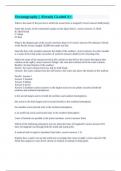Exam (elaborations)
Oceanography || Already Graded A+.
- Course
- Institution
What is the name of the process in which the ocean floor is mapped? correct answers Bathymetry Name the 4 parts of the continental margin on the figure below. correct answers A: Shelf B: Shelf Break C: Slope D: Rise What is the deepest part of the ocean? And how deep is it? correct answers...
[Show more]



